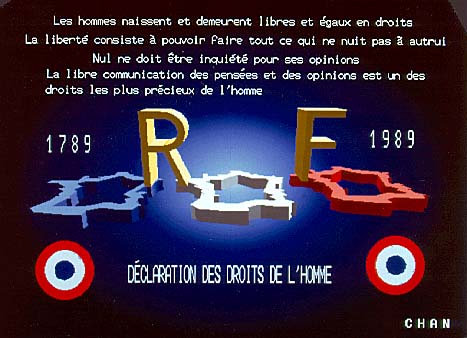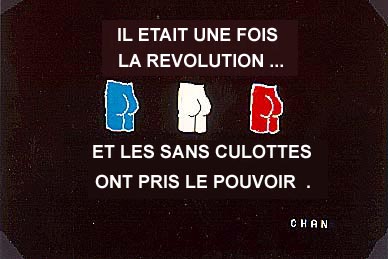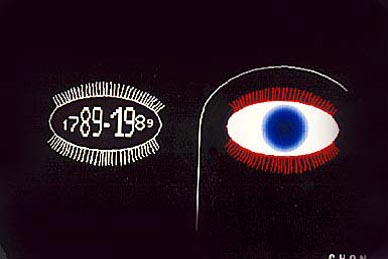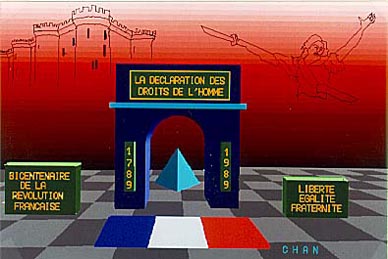DECLARATION OF THE HUMAN RIGHTS
AND OF THE CITIZEN
Issue by the National Assembly in the meetings of the 20, 21, 23,
August 24, and 25 1789, accept by the KING.
PREAMBLE
The representatives of the French people, constitute in national assembly, considering that ignorance, the lapse of memory or the contempt of the human rights are the only causes of public misfortunes and the corruption of the governments, solved to expose, in a solemn declaration the natural, inalienable rights and sacrings of the man; so that this declaration, constantly presents has all the members of the social body, unceasingly points out their rights and their duties to them; so that the acts of the legislative power and those of the executive power, being able Ítre at every moment compare with the goal of each political institution, are more respect; so that the complaints of the citizens, founded from now on on simple and undeniable principles, always turn to the maintenance of the constitution and the happiness of all.
Consequently, the national assembly reconnait and declares, in presence and under the auspices To be it supreme, the following rights of the man and the citizen.
Article first - the men are born and remain free and equal in rights; the social distinctions can be founded only on the common utility.
Article 2 - The goal of any political association is the conservation of the natural and imprescriptible rights of the man. These rights are: freedom, the property, safety and resistance have oppression.
Article 3 - The principle of any sovereignty lies primarily in the nation; no body, no individual cannot exert authority which does not emanate from it expressly.
Article 4 - Freedom consists has to be able to do all that does not harm has others. Thus, the exercise of the natural rights of each man has terminals only those which ensure the other members of the company the pleasure of these same rights. These terminals can be given only by the law.
Article 5 - The law has the right to defend only the harmful actions at the company. All that is not defended by the law cannot be prevents, and no one cannot constrained Ítre has to do what it does not order.
Article 6 - The law is the expression of the general will; all the citizens have right to contribute personally, or by their representatives, his formation has; it must be the same one for all, either that it protects, or that it punishes. All the citizens being equal has its eyes, are also acceptable has all public dignities, places and employment, according to their capacity and without another distinction that that their virtues and their talents.
Article 7 - No man cannot be shows, decree, nor held that in the cases determined by the law, and according to forms' which it prescribed. Those which solicit, dispatch, carry out or make carry out arbitrary orders must be punished; but any citizen appele or seized under the terms of the law must obey has the moment: he makes himself guilty by resistance.
Article 8 - The law should strictly establish only sorrows and obviously necessary and null Ítre can punished only under the terms of one established law and promulguee before with the offence, and legally appliquee.
Article 9 - Any man being supposes innocent until it was declares guilty, if he is a judge essential to stop it, any rigour who would not be necessary to ensure himself of his person owes Ítre severely reprimee by the law.
Article 10 - No one does not owe Ítre anxious for its opinions, same religious, provided that their demonstration does not disturb the order piblic established by the law.
Article 11 - The free communication of the thoughts and the opinions is one of the most invaluable rights of the man; any citizen can thus speak, write, print freely, except A to answer of the abuse this freedom in the cases determined by the law.
Article 12 - Guarantee of the human rights and the citizen required a police force; this force is thus instituee for the advantage of all, and not for the utility particuliere of those has which it is confiee.
Article 13 - For the maintenance of the police force, and for the expenditure of administration, a common contribution is essential; it owes Ítre also set out again between all the citizens, because of their faculties.
Article 14 - The citizens have the right to note, by them-same or their representatives, the need for the public contribution, to agree it voluntarily, to follow employment of it, and to determine of it the share, the plate, covering and the duration.
Article 15 - The company has the right to ask for account has any public agent of its administration.
Article 16 - Any company in which the guarantee of the rights is not assured, nor the separation of the capacities determined, does not have a constitution.
Article 17 - The property being an inviolable right and crowns, no one cannot be deprives of it, if it is not when the public need, legally contatee, require it obviously, and under the condition of a Juste and preliminary allowance.
<>Beginning of the page) >
This declaration of the human rights and the citizen was adopted by the national Assembly on August 26, 1789.
|
Francais

English
Francais

English








French

English